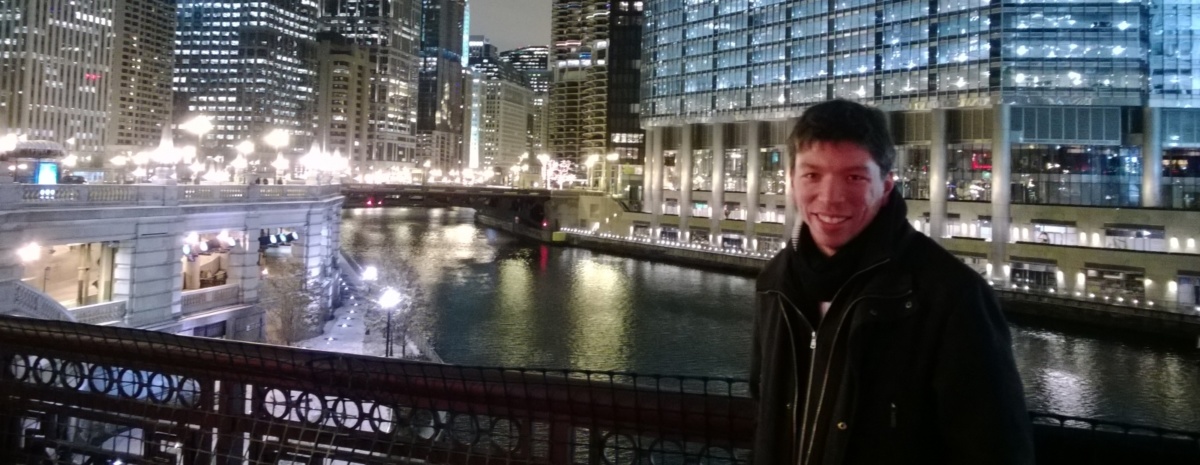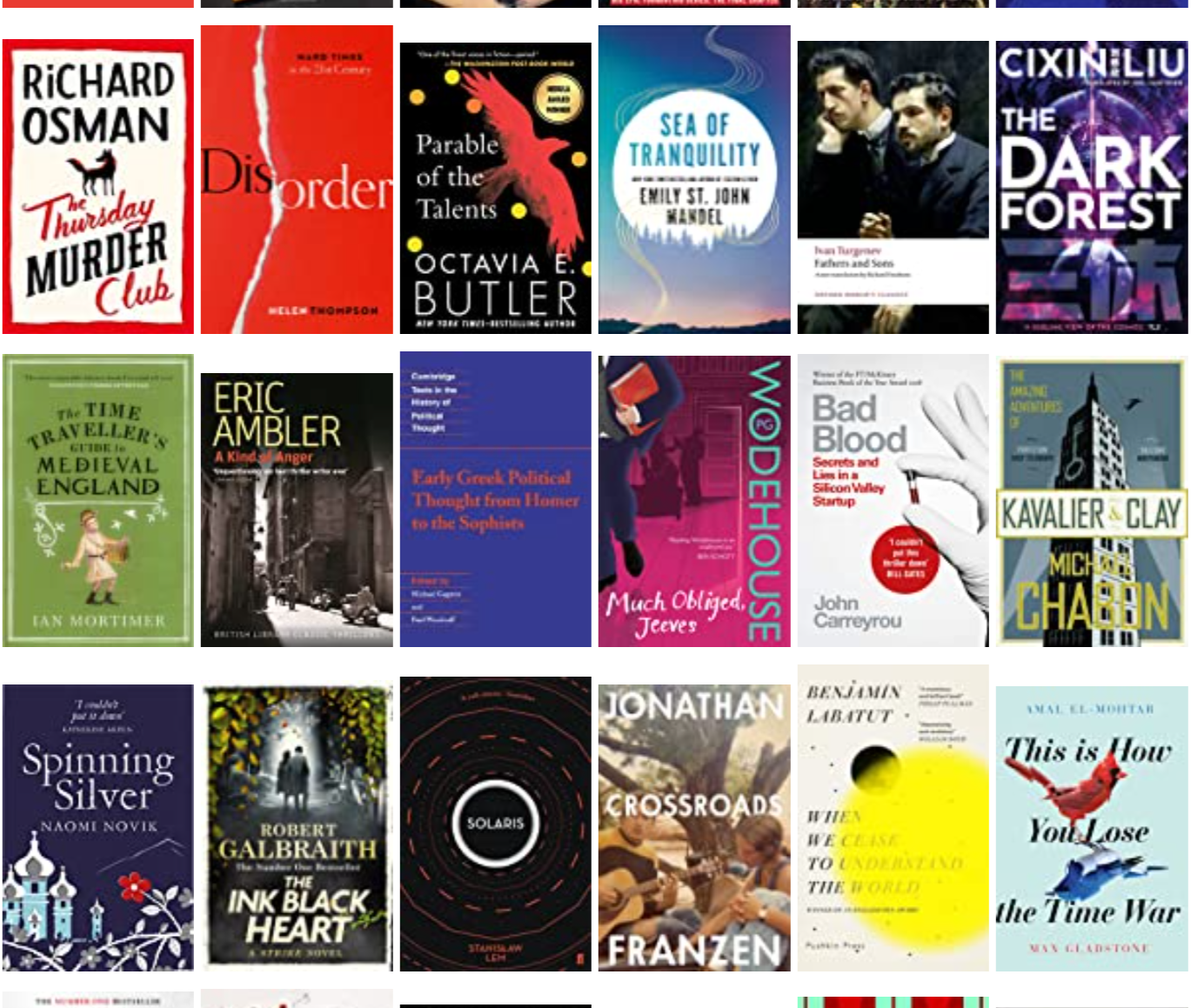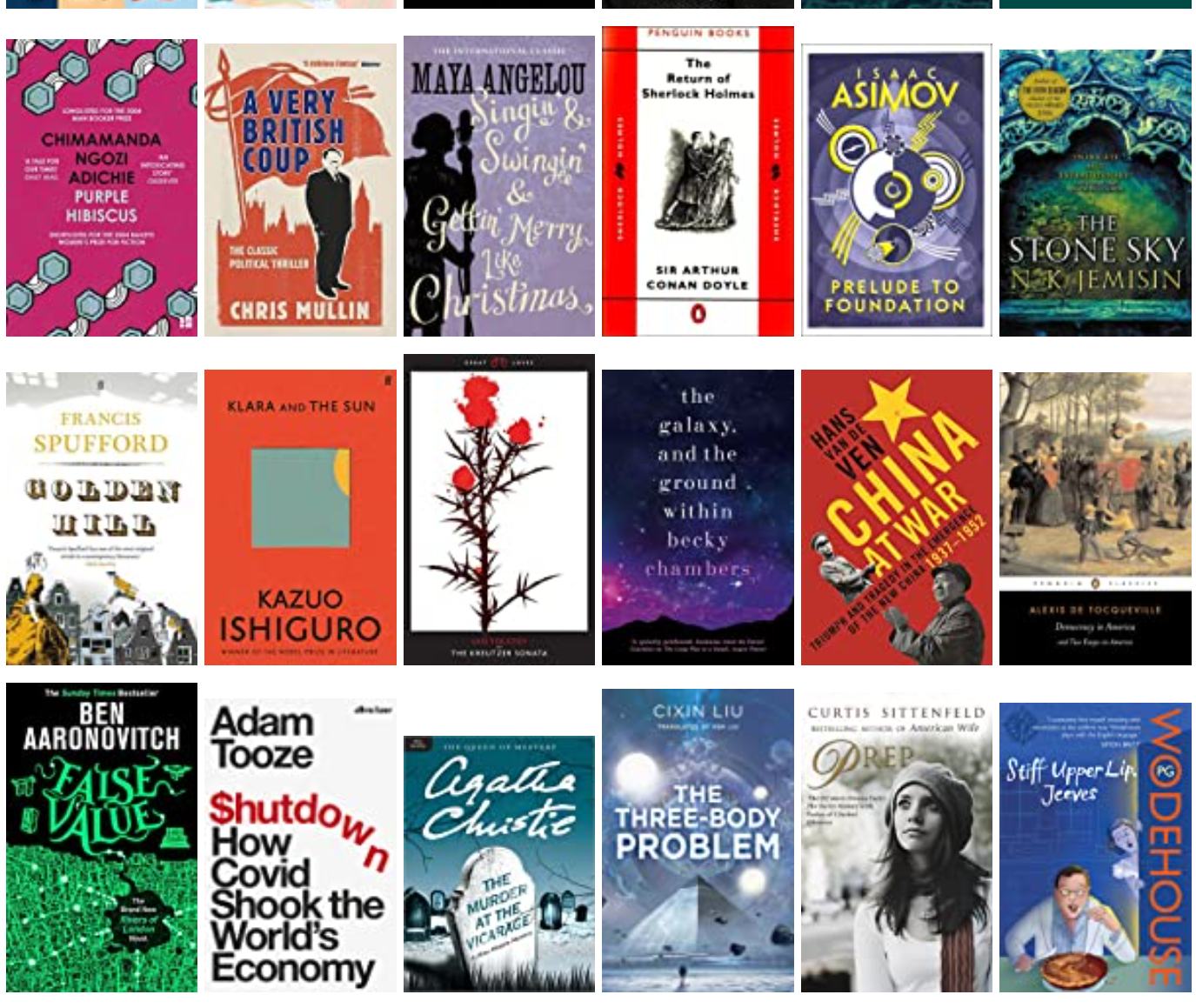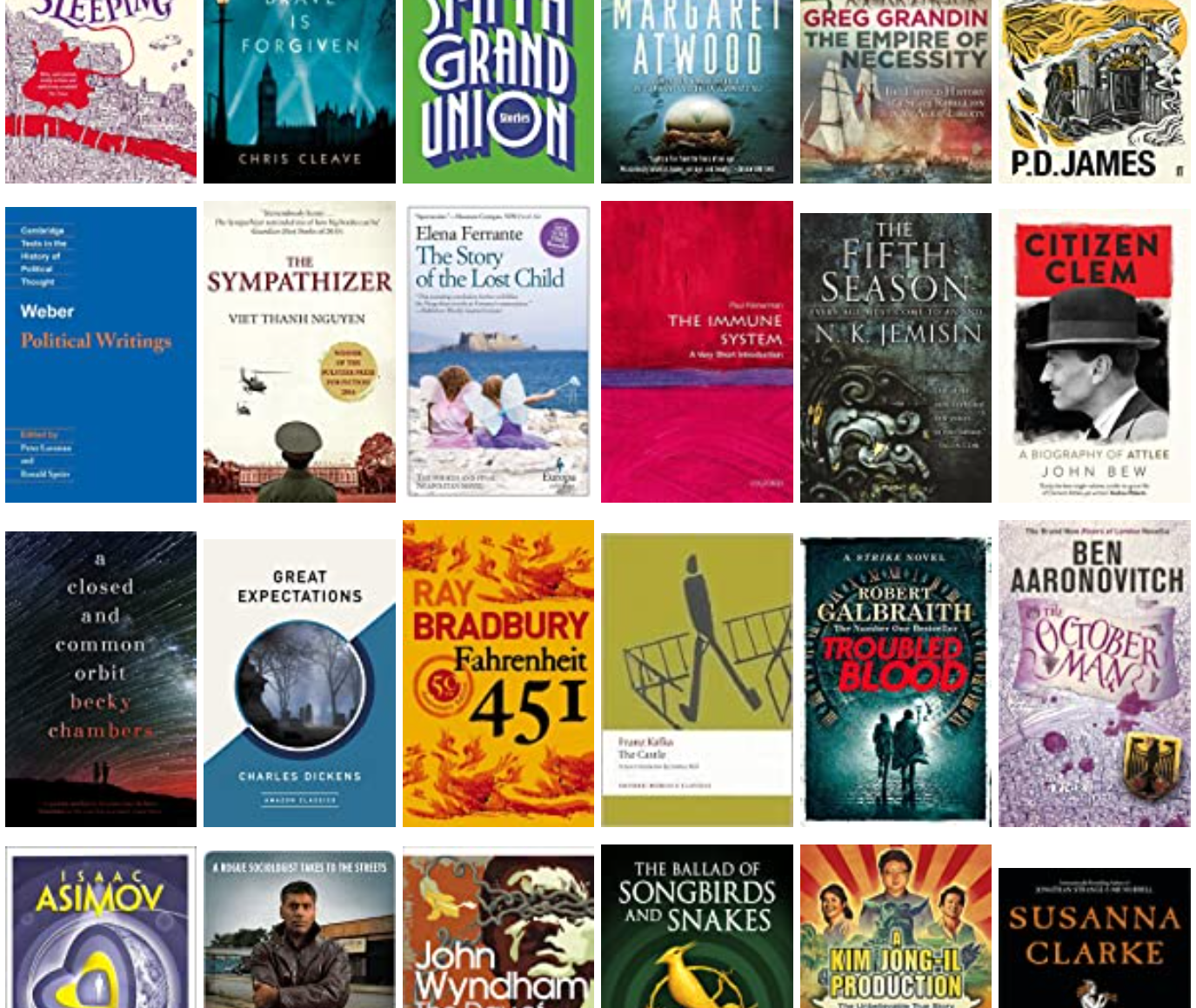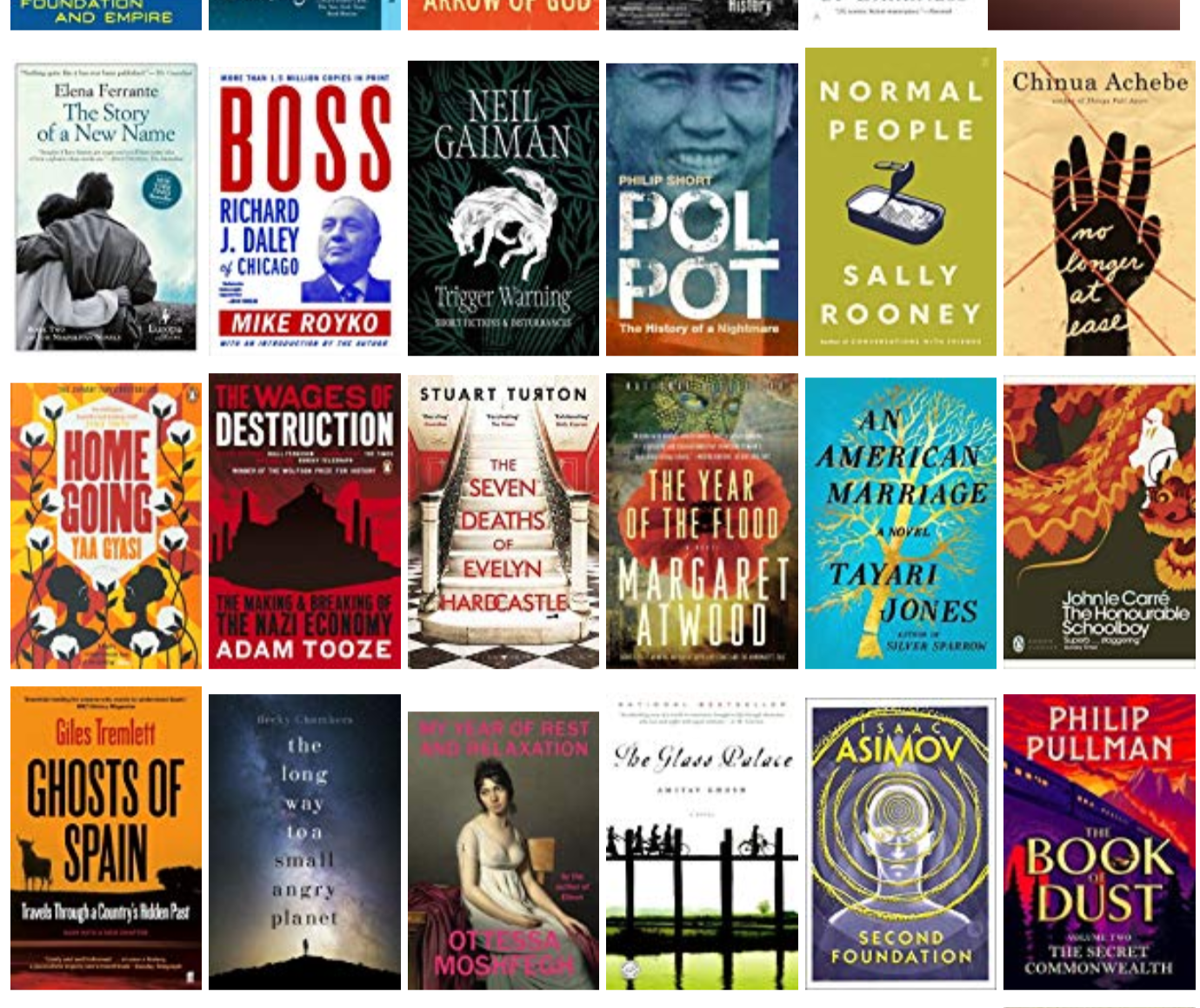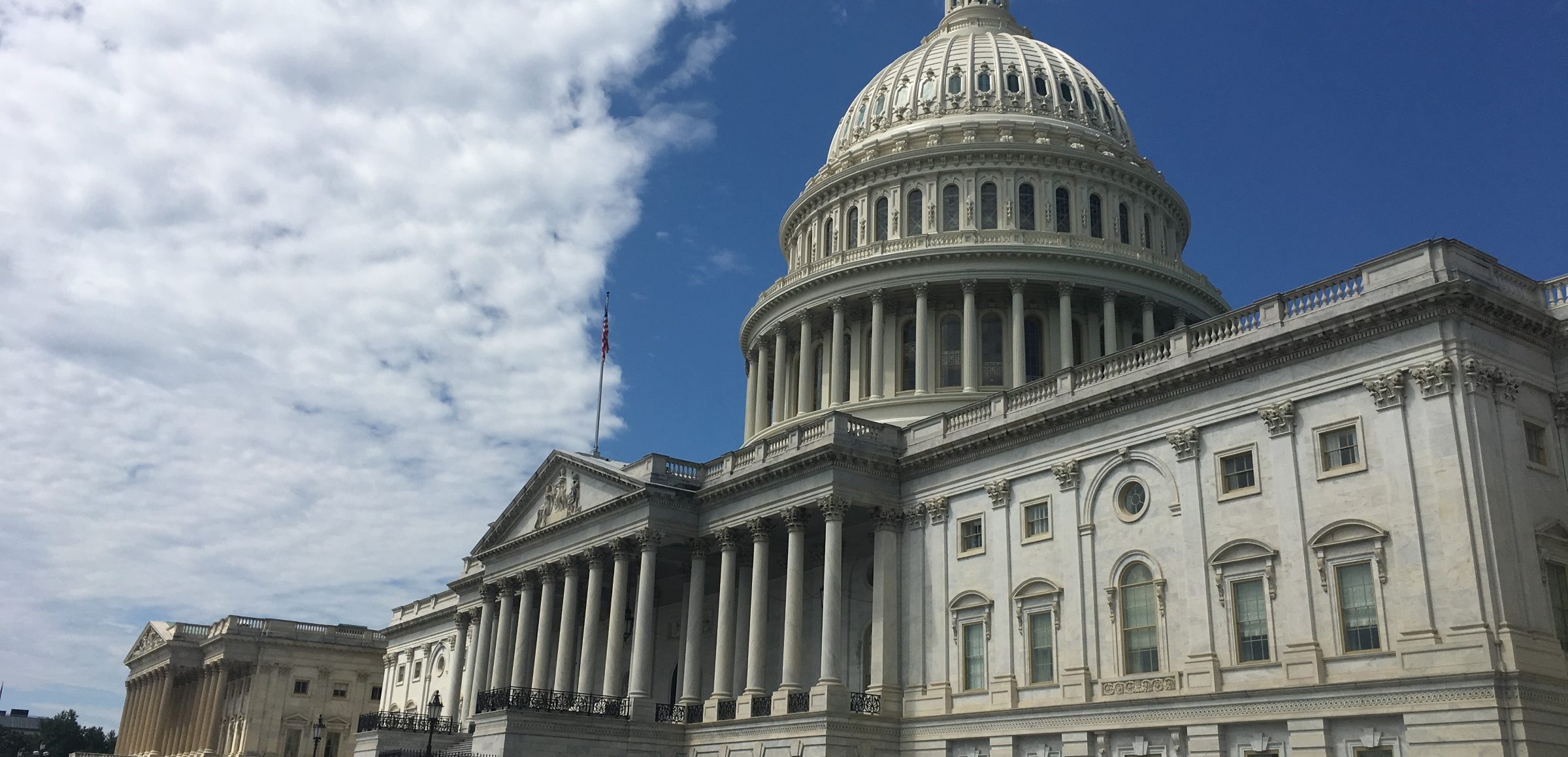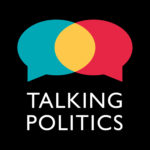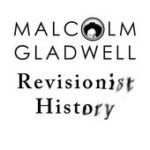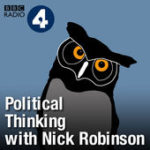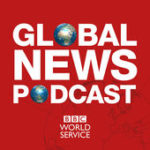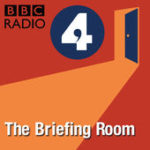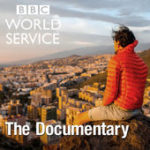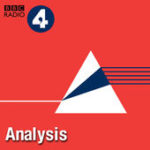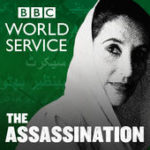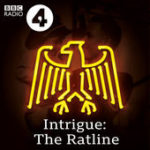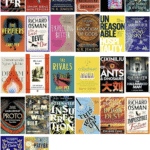Finally: a (very slight) reversal in fortunes for my reading total! This year I managed 30 books, up from 29 in 2021, and the only thing it cost me was my peace of mind after spending New Year’s Eve immersed in a claustrophobic Gothic thriller. But more on that later…
Fiction
It may be a self-fulfilling prophecy, but once again the first book I read this year – Fatherland, by Robert Harris – turned out to be one of my favourites. First published in 1992, this was Harris’s debut novel and the one which made him famous, no doubt driven by our perpetual collective fascination with Nazi history. Fatherland is a classic of alternative history, set during the 1960s in a victorious Nazi Germany which diverged from our own timeline after 1942. The use of real people and events from our common history until that point makes this imagined world feel chillingly familiar, and the story itself is a captivating detective thriller which, at its heart, is more interested in unearthing the (real) events of the Wannsee Conference than solving a totally fictional mystery.
While my first Robert Harris novel was a hit, my first Jennifer Egan novel – Manhattan Beach – was more of a miss. Indeed, Todd and Carolyn were surprised that this was the one I picked to read, and the book’s promised intrigue was never really parlayed into a strong emotional connection to the characters. For me, the most moving section was when Anna – the first female diver at the Brooklyn Navy Yard – dives successfully for the first time. I had similarly mixed views about The Poisonwood Bible, Barbara Kingsolver’s book about an American missionary family living in the Congo. The fact that the four daughters are a little too cleanly well-defined, bordering on caricatures, made the story easy to follow but less good than it could have been. It also felt like the climax arrives prematurely, with the family’s great disaster and subsequent exodus concluding long before the final page.
One book I did love in 2021 was The Three-Body Problem, and the second book in the trilogy – The Dark Forest – was also incredibly good. I found it slower to get into at first – it took me a month to finish! – but overall Liu Cixin avoids the classic middle-book problem by adding an impressive cocktail of new ideas and concepts. Quick summary: faced with a slow-moving but overpowering invasion force, humanity devises the Wallfacer Project to give four individuals (‘Wallfacers’) incredible unchecked power to work on secret counter-strategies. Added to this are ‘Wallbreaker’ opponents, hibernation into the future and – ultimately – a crushingly dark explanation for the Fermi Paradox from which the book gets its name. I’m so excited for the final installment!
This year I also made a return visit to Octavia Butler’s two-part dystopian ‘Parables’ series for Parable of the Talents. This is relentlessly grim and depressing, with a level of violence which can feel gratuitous and inescapable. Nevertheless, there’s a deep cleverness in how Butler presents Lauren, the original book’s hero, as a delusional cult leader through the retrospective eyes of her daughter Larkin. How are we supposed to feel about Lauren, really? Butler is deliberately ambiguous, but for me I couldn’t shake the feeling that her single-minded dogma might still be basically correct. And if you read the book this way, the final chapter – where humanity finally takes a small, shaky, horribly imperfect step towards Lauren’s spacebound future – is a moment of hope. I was also fascinated by the scraps of information available on Butler’s aborted third book in the series, Parable of the Trickster, which exists only as dozens and dozens of false starts in the archive. Such a tantalising glimpse into what might have been.
Solaris was a gift from Tash and a really interesting book to think about, especially since we know that the author, Stanisław Lem, didn’t think much of the English translation. The basic science-fiction concept of a vast, mysterious, sentient but unknowable ocean planet is compelling, but it can be difficult to keep the pace through the first-person narrative, and the lengthy academic biographies of the Solaristics are very boring. (And yes, I do realise they’re supposed to be.) Once I finished the book, though, I was struck by a rebellious feeling that humanity actually acquits itself rather well. Solaris is partly about the inherent limits to our capacity to understand something truly alien, and the point of the tedious academia is to show that science is – to some extent, anyway – doomed to stumble around in our anthropomorphisms forever. But actually, a lot of the theories and observations made by the scientists feel like they are useful pieces of a puzzle, and do contain some truth, even if a neat and tidy explanation (or mutually satisfying alien ‘contact’) is never reached. So, no need to be so pessimistic!
Sadly, it’s also true that the obvious racism and sexism in Solaris is grating, even if the book still stands up as a whole. Things are less clear for Evelyn Waugh’s Decline and Fall, which bumbles along as a light-hearted social satire (unassuming scholarship student Paul Pennyfeather is kicked out of Oxford after becoming an innocent victim of some drunken toffs, before finding a teaching job at a rundown boarding school) until the appearance of a black character, Chokey, at the school sports day. Repeated use of the n-word follows. I’m not trying to censor the book out of the universe, and – in fact – the ignorance and bigotry of the white characters is partly (but only partly) what’s being lampooned. The point is more that Decline and Fall is supposed to be a comic novel which makes you laugh, but comedy is hard to transplant out of its own time and for a modern reader this whole section is a serious wrench.
The obvious comparison to Waugh is Wodehouse, although he’s much less interested in social critique and more about the comic foibles of individuals. Still, the most memorable moment in Much Obliged, Jeeves – written in 1971, and one of the last Jeeves stories ever told – is when Wooster is persuaded to go canvassing at a general election. Given that these books usually take place in a totally sealed-off pseudo-Edwardian bubble, it was a very strange moment of collision with a more modern world.
If we’re going for controversy, this is probably the moment to say how excited I was for the next book in the Cormoran Strike series – The Ink Black Heart – even as the author’s public persona becomes more and more unpleasant. To state the obvious, this is a review of the book – and not of JK Rowling – which was as engrossing and page-turning as ever. It’s not the best in the series, though, with a few moments which felt fundamentally unbelievable (e.g. Robin’s physical recklessness) and some backpedalling on the central Robin/Strike relationship which seems to reverse some of the progress last time. Moreover, and without giving anything away, I’m still not entirely clear on the villain’s motivations for acting exactly when they do. That said, there are some standout moments – the absolute best is when the tissue of lies around one sympathetic character suddenly falls away and the crushing cruelty of the true situation is exposed.
OK, time for an unambiguously great book: Spinning Silver, by Naomi Novik. This was a birthday gift from Oliver and Abi, but seeing as it features multiple Jewish weddings – including the Hora – it was the perfect book for me to be reading this September. The story is a fairytale about debt and obligation set in a beautifully atmospheric medieval kingdom, and I could almost feel the chill of the frost in the air as I read it. The characters are striking and memorable, and the whole novel is a potent blend between the outright fantastical elements and the Jewishness of the main character, Miryem. Together with Fatherland I guess my winning theme this year was stories set on this borderline, which is also true of Benjamín Labatut’s When We Cease to Understand the World. This is a strange one. Self-described as a ‘work of fiction based on real events’ where the ‘quantity of fiction grows throughout the book’, this is a collection of essays / short stories / other things about the inner struggles, torments and ‘genius’ of some great twentieth-century scientists. Weirdly brilliant and fascinating, and maybe best thought of as both fiction and non-fiction much like the wave/particle duality.
I’ve been waiting for the first obvious “book written during Covid-19” and Emily St. John Mandel’s Sea of Tranquility was it. The time-travel concept is not hugely original, but it’s a short story which doesn’t overstay its welcome and I certainly enjoyed it. (Plus I discovered later that one of the timelines is a spinoff from The Glass Hotel, which I haven’t read yet, but am now intrigued about.) A more unusual time-travel book was This Is How You Lose the Time War – nicked excitedly from Katie’s flat – a lyrical and poetic love story which was nothing like what I expected, but in a good way. This style of writing doesn’t always play to my strengths as a reader but I could still admire the beauty even if I don’t linger on the words long enough to truly soak them in. Plus I like to imagine Red & Blue out there in the universe together still, chased but uncaught.
Deep down, I think I always knew that The Amazing Adventures of Kavalier & Clay wouldn’t do it for me, in part because the golden era of comic books in 1940s New York doesn’t resonate enough as a backdrop to compensate for the ponderous writing style. I am sure that this is a ‘good book’. But it’s also a long book, and I just didn’t have much to say about it afterwards. (Although now in my head it is melding with Manhattan Beach, which is kinda fun.) A more recent attempted entry into the ‘great American literature’ canon is Jonathan Franzen’s Crossroads, which – as always with Frazen – I found very readable and enjoyable even though I didn’t think it was peak-Franzen. Main complaint: the plots all end a little abruptly, with the final chapter making it seem that the relationship between siblings Clem and Becky was The Defining Theme of the whole novel, which wasn’t what it felt like along the way. Still, this is but the first part of a multi-generational trilogy so I’m sure there will be more to develop, and I’m here for it.
I liked The Thursday Murder Club. I did. I have no snobbish objection whatsoever to Richard Osman writing a series of fun, popular murder mysteries about a group of retirees who solve crimes. My problem is – and I know this makes me a terrible person – I can’t help but get annoyed when old people play the we’re-too-old-to-follow-the-rules schtick. And I know that this objection doesn’t even make sense! There isn’t an ameteur detective of any age in any book who just sits patiently and does what the police tells them – otherwise there wouldn’t be a story! So, I get it. The problem is me. But still, I liked Agatha Christie’s The ABC Murders more. This is her take on the serial killer trope (“basically an episode of Criminal Minds” as one reviewer writes on Goodreads) and it’s all very good and clever and intricately worked out. Ahh you think they’ve figured it out? Ahh but they haven’t yet. But don’t worry, Poirot will save the day.
Forward the Foundation was the very last book published in Asimov’s Foundation series, although it’s a prequel and the last chronological book – Foundation and Earth – is the one which will hold the last word in my mind. A Kind of Anger was exactly what you want from an Eric Ambler Cold War-era spy thriller, and my only worry is that I’m about to run out of Eric Ambler Cold War-era spy thrillers. Fathers and Sons (Turgenev’s Russian classic from 1862) was probably more funk-inducing for me to read than it would have been before my own father died, which added an extra layer of sadness to this (very good) tale of young nihilism and the growing divide between generations.
Amongst Our Weapons was a pretty good entry in the Peter Grant canon, although I agree with the general clamour for more Nightingale to feature in the books again. And then, sure, it’s true I only read The Slow Regard of Silent Things because I didn’t want to totally forget about the Kingkiller Chronicle world as we all wait for the much-delayed-maybe-never-coming third book. The author is at pains to stress, repeatedly, that you probably won’t enjoy reading it because it’s a short character study on Auri – a young woman who lives underground and has a deep bond with inanimate objects – without much of a plot. But I won’t take the bait. I did enjoy it. It was a good character study.
And finally – just in the nick of time – I rounded up this year’s reading to a satisfying total with Shirley Jackson’s We Have Always Lived In the Castle. There’s a spark of electricity running through this Gothic thriller, and the opening hooked me in immediately. Written in the unsettling narration of eighteen year-old Mary Katherine ‘Merricat’ Blackwood, there are dark undercurrents, deception and self-deception behind the mystery of what exactly happened, six years prior, to leave almost all the other Blackwoods dead. Recommended.
Non-Fiction
The first non-fiction book I read this year was Peter Mandler’s The Crisis of the Meritocracy, which has a special place in my heart because (a) he pulled a copy off the shelf to give to me when I went round for tea last year, (b) it sits proudly on my bookshelf next to Melissa Benn’s School Wars. Mandler and Benn have been a double-act in my life for many years now, locked in a perpetual field of agreement and disagreement, but a few months ago they both messaged me separately (within hours of each other… it was really cute) after finally meeting in person, and I felt very happy to have been a small conduit between two of my big education influences.
Anyway – none of that tells you anything about the book, it’s just some personal colour I forgot to include in previous blog posts. Where were we? Ah yes, The Crisis of the Meritocracy, which is a somewhat confusing title for this pretty upbeat, positive story about British mass education since the Second World War. The key move is to take a ‘demand-side’ view, and Mandler’s point is that the country’s population has consistently shown a powerful, democratic desire for more and better education. This pushes elites to respond, often with hesitation and reluctance, despite a perennial fear that we’re just about to bump up against the mythical upper-limit of people who might ‘usefully’ benefit from wider participation. It’s a useful corrective to the traditional top-down story of ideologically-driven ‘reforms’ from both the left and the right, and I thoroughly enjoyed it.
Sticking with the more academic end of the spectrum, I also enjoyed Helen Thompson’s Disorder: Hard Times in the 21st Century even though, as the title suggests, it’s much bleaker in tone. Truth be told, I don’t remember all of the threads of her argument but – if you remember one thing from Thompson – it’s the centrality of energy supplies and energy markets. In 2022, after the Russian shock to European gas prices and resulting political fallout in the UK and elsewhere, this was an easy lesson to remember.
On a very different note – although I can just imagine Helen Thompson in my ear pointing out how the whole Silicon Valley ecosystem was driven by the era of cheap money – it’s impossible not to be hooked by John Carreyrou’s Theranos thriller, Bad Blood: Secrets and Lies in a Silicon Valley Startup. Part of the fun is that the story of the book itself is also the story of Elizabeth Holmes’s downfall. Often, you finish a book of contemporary non-fiction thinking “that’s so awful and intractable” whereas this year was the very year of Holmes’s guilty verdict and sentencing. Anyway, if you’ve been living under a rock: Elizabeth Holmes tries to emulate Steve Jobs with a fake-it-till-you-make it approach to blood testing. But they never do make it, resulting in potentially catastrophic harm to patients, while anyone raising the alarm is hunted down by a company with a particularly ruthless streak. If you’re reading this, you’ve probably read this book already. But if you haven’t, it’s quite a ride.
Bill Bryson’s One Summer was quite different to what I was expecting, but nonetheless a fascinating tour of what was making waves in America during the summer of 1927. I like how it makes you realise how transient culture is: what is huge and important today may be totally forgotten tomorrow. Going much further back, I really did enjoy The Time Traveller’s Guide to Medieval England. Sure, it is a little baffling for the author to pretend that he’s just invented the concept of exploring the past in the present-tense. People have fantasised about this for a long time. But while it isn’t novel, it is fun – especially for someone who never studied this period. From memory, I think I decided that my best bet would be to try and find a well-functioning monstrary. That is, if I’m not killed by one of the many ‘hilarious’ acts of random violence or cruelty which (allegedly) abounds in the medieval world.
I thought I had taken better notes on Early Greek Political Thought from Homer to the Sophists, but I did not. So it’s a difficult book to review because, of course, there were many different ‘early Greeks’ and they held many different views. Many were, dare I say, not as all-encompassingly terrible as Plato was. Most were, unsurprisingly, very sexist. Which brings me neatly to my final non-fiction book of the year: Caroline Criado Perez’s Invisible Women, about the “male as default” thinking which still pervades many aspects of our lives, including in critical data about the world.
I’ll come right out and say that this is a really good book, which is why I’ve seen others recommending it many times since it was first published in 2019. At the same time, it’s also a book where its real power lies in reaching beyond the small audience who will ever read it cover-to-cover. That’s why the anecdotes about car crash dummies modelled exclusively on male bodies, snow ploughing designed for male travel patterns and (in the most infuriating chapter of all) potentially life-saving drugs which unknowingly have entirely opposite effects on men and women all seem so familiar: it’s because you’ve heard them already in newspaper columns, podcasts and conversations inspired by the book.
Of course, a lot of its wider brief – especially on women’s unpaid care work – is hardly news to anyone who’s read anything similar before. But it would be a bit churlish to blame Perez for the intractably sticky nature of the problem. And this is a particularly good account, with a practical tone which balances an acerbic critique with practical, politically actionable changes – rather than the hand-wavy ‘any change will be illusionary until society is totally reimagined’ framing which is sometimes found in the final chapter of a book like this. I do wish we could have a moratorium on the kind of sentence where an author explains that, although change X will cost £Y, it would actually pay for itself over time because of Z. There’s almost no policy proposal which couldn’t be written in those terms, and the formulation is designed to hide trade-offs which are usually lurking in the background. But that’s one of the reasons this is such a good book. At heart, it’s a democratic argument – a majoritarian argument – because given that roughly half of humanity is female, the potential upsides to making better trade-offs are so enormous they will always be worth perusing. Even if it feels like you’ve read it before.
The slow decline of my reading total continues, with only 29 books completed in 2021. That said, writing my annual recap has left me feeling pretty upbeat about the quality of books I got through this year. So if you’re looking for inspiration, I hope you find something which intrigues you in the selection below!
Fiction
The first book I read each year often sticks in my mind and Meg Wolitzer’s The Interestings is no exception. I chose it as a deliberate palette cleanser from sci-fi and fantasy, and despite a lack of alien invasions this character-driven novel about the intersecting fates of a group of teenagers who meet at a summer camp in the 1970s never felt slow. Sadly, it did strike me as a little unbelievable that the wealthy Wolfs would be so terrified of a rape trial for their son Goodman given how unlikely a conviction would be, and I would have liked to have learnt a little more about his accuser Cathy. But overall it’s noteworthy how fresh these characters and relationships have stayed with me over the year.
I put off reading Purple Hibiscus for a while because I was told it was intensely sad, but actually there’s plenty of hope in Chimamanda Ngozi Adichie’s debut novel too. It’s a tighter, more contained book than Half of a Yellow Sun (still my favourite) about a fifteen year-old girl, Kambili, whose family is kept under tight control by her professionally heroic but domestically abusive father. Its beautifully written, and I enjoyed reading another novel in a Nigerian setting. Also, I have so much love for Aunty Ifeoma who takes care of Kambili and her brother for a portion of the book.
The obvious thing to do with Stuart Turton’s The Devil and the Dark Water is to compare it to The Seven Deaths of Evelyn Hardcastle, his first book, and conclude that it’s nowhere near as gripping as that. But, judging on its own merits, this is still a fun blend of detective and/or supernatural horrors set in the evocative, claustrophobic world of a seventeenth-century ocean voyage. Klara and the Sun, meanwhile, is up there close to the best of Ishiguro even if, deep down, you start to wonder if all Ishiguro novels are shades of the same story. In this variant, the perceptive-but-not-fully-understanding protagonist is an ‘Artificial Friend’, Klara, who cares for a sick fourteen year-old child, Josie. It’s a haunting and beautiful story, with themes of loss, sacrifice and love, and if you’re already a fan of Ishiguro you’ve probably read this already anyway.
This year I completed N.K. Jemisin’s Broken Earth trilogy with The Stone Sky, and this remains one of the most outstanding series I’ve ever read. I’ve also nearly finished Asimov’s Foundation series with the first of his two prequels, Prelude to Foundation. You’re never going to read this for the complex plotting or characters – who always hop from place to place in search of something – but the story continues to bind the whole series closer to Asimov’s Robot books in a satisfying way. Talking of sci-fi series: in 2021 I also completed Becky Chambers’s Wayfarers novels with Record of a Spaceborn Few (featuring the human community of the Exodus Fleet trying to hold on to its traditions) and The Galaxy, and the Ground Within (strangers trapped by circumstance at an interstellar rest stop). The former was probably my favourite plot-wise for its clever interweaving of the characters’ stories, but I do hope the author changes her mind about the latter being the ‘final’ entry in the series and writes more at some point.
Sometimes you get lucky about when and where you read a book. I had Prep on my list for years as a recommendation from Melissa, but didn’t happen to pick up this emotionally intense coming-of-age story until I was sitting in Randi’s parents’ sunny back garden and had the time to fully immerse myself. Lee Fiora is a fourteen year-old Midwesterner who ends up at an elite, monied boarding school in Massachusetts. As you might expect, she struggles to find her place and excels at self-sabotage, so much so you want to shake her and tell her to stop messing everything up. But I really enjoyed reading it and found it a refreshing change from more high-concept books.
In Singin’ & Swingin’ and Gettin’ Merry Like Christmas, the third of Maya Angelou’s fictionalised autobiography, things are finally looking up for her! This volume especially connected to me with its background on the George Gershwin song Summertime, which I’ve always known but didn’t realise came from the 1935 opera Porgy and Bess or that Maya Angelou (who acquires the name in this book) performed in its 1950s European tour. On the topic of American history, reading Golden Hill (on loan from my mum) made me very curious as to whether early American colonies actually celebrated Guy Fawkes night to any great extent. It took me a while to get into its impressive but slightly showy writing style, but over time I enjoyed following the mysterious Mr. Smith and his troublesome stay in New York. I also got close to guessing the ending.
I didn’t want to read A Very British Coup until Corbyn was no longer Labour leader (too painful) which means we’ve now passed the second wave of interest in this 1980s political thriller, originally written as a Cold War-era warning on how the murky British Establishment would bring down a socialist Labour government committed to unilateral disarmament and NATO withdrawal. Basically, Harry Perkins is an all-round decent bloke who somehow becomes Prime Minister without much scheming (which seems unlikely) and then assumes he’ll have free reign to implement a bucketload of highly controversial policies, all at once, without deigning to engage in the messy business of actual politics where you do deals, form alliances, pick priorities and choose between difficult trade-offs.
Obviously, it’s impossible not to feel sorry for Harry when his government is brought down through unfair, underhand and conspiratorial means. But at the same time, gimme a break. Even Bevan realised he would have to make peace with GPs to create the NHS. There’s also an infuriating sequence early on when Harry picks a British-made power plant from a close-to-bankrupt company over a cheaper American alternative, explicitly on the notion that there was “nothing to choose between the two… on safety grounds” (his words!) and then gets unbelievably lucky when the American option turns out to be prone to meltdowns. Good for him. But what’s the ideological takeaway here? Protectionism works because British power stations couldn’t explode? What’s his American equivalent supposed to do then?
The Kreutzer Sonata was a recommendation from Kira to demonstrate Tolstoy’s misogyny. I’d say it delivers on this pretty heartily, which makes it all the more baffling that this plea for abstinence as the only alternative to violence, jealousy and murder was published by Penguin in their ‘Great Loves’ series. The Stranger is Albert Camus’s short, gripping 1942 novella in which the main character drifts inexorably towards the guillotine. Given that it’s 2021 I probably should have started with The Plague, but that can be next. Serpentine was a short-but-sweet entry in the His Dark Materials universe, and a nice glimpse of Lyra growing up, albeit laced with sadness given the state of her relationship with Pan by the time of The Secret Commonwealth. And I can’t say anything about Stiff Upper Lip, Jeeves except that I fear the moment looming when I officially run out of cheerful Jeeves and Wooster pick-me-ups.
After a long break, this year I also returned to the original detective who begat all others with the short story collection The Return of Sherlock Holmes. Even though Doyle had already ‘killed off’ Holmes in The Final Problem and was bullied into bringing him back, I actually got into this more than the previous stories and it felt like Doyle had really hit his stride with his beloved characters. (See, Becky Chambers, there’s a moral here for you.) Also, Holmes’s complaint that Watson is always “looking at everything from the point of view of a story” and choosing to”dwell on senstational details”, thereby ruining the instructive potential of his examples, is hilariously meta. Pleasingly, Agatha Christie’s first story featuring Miss Marple, The Murder at the Vicarage, pays tribute to Sherlock Holmes with a couple of sly nods. I both loved and feared Miss Marple herself, and while I wouldn’t want to be her neighbour I will definitely check back on her nosy investigating skills.
Parable of the Sower is the first of two instalments in Octavia Butler’s famous dystopian series. It’s a fairly gritty, near-future version of dystopia: this is an undisguised America of 2024 in which society has completely broken down into violent enclaves rather than a post-apocalyptic allegory with strong fantasy themes. The hero is a tough, determined teenager – Lauren – with the rare ability of ‘hyper-empathy’ which causes her to feel the physical pain of others. To be honest, I found the ‘hyper-empathy’ element to be the least interesting strand in an otherwise engaging narrative as Lauren leads a small group of survivors from her destroyed community along the US highway system to found a new community and expand on her religion of Earthseed, and I’m excited for the next volume.
This was an exciting year for me in Ben Aaronovitch’s Rivers of London series, as I finally came up to date with the latest books by reaching False Value and, for bonus content, the novella about Peter’s cousin What Abigail Did That Summer. False Value is an important moment for the series, since the last book had wrapped up the long-running plot threads, and it was nice to be able to start afresh with some new characters and a high-tech corporate setting ripe for parody. As a gullible idiot, I genuinely started by thinking Peter might have left his job and taken up private security work rather than be posing as an undercover agent. But of course he hasn’t. Meanwhile, Abigail’s adventure with the foxes of Hampstead Heath was a delight – especially as I started reading it the day after Christmas at Kenwood, so the Heath was all fresh in my mind. More, please!
I normally end this section by gushing about a novel which is already widely recognised and highly acclaimed. This year is no exception, I’m afraid, but if Liu Cixin’s brilliant The Three-Body Problem is still sitting on your to-read list then you should absolutely give it a try. Somehow, this book combines physics and Chinese history into a clock-ticking thriller, producing a philosophically rich but simultaneously page-turning read. Perhaps you’re getting a sense of how hard it is to describe this thing, but that’s what makes it so good. For a start, it taught me about the actual ‘three-body problem’. There’s also a building sense of metaphysical horror right from the start, which is acute and deeply felt, that the universe may not be scientifically observable. The sequences inside the ‘Three Body’ video game are memorable even though they should be tedious, the use of nano material as a weapon made me wince in pain, and the ending sets up an epic confrontation to follow in subsequent books. If you enjoy science fiction, don’t delay. And if you’re still unsure, Barack Obama provides the endorsement on the cover of the English edition.
Non-Fiction
I have a feeling that nobody reads this for the non-fiction recommendations. This year, a lot of my non-fiction brain was taken up with Tocqueville’s 1835/40 Democracy in America (originally published in two volumes) which is fairly… long. It’s good – Tocqueville is famously perceptive – but it’s not a quick read with a single theme, and you should absolutely form your opinions of Tocqueville from a deeper analysis than a paragraph or two on a blog. That said, everything he says about the power of judges and lawyers in the United States is ferociously on-point, as is his conclusion to the first volume which reads like a movie trailer for the Cold War a century later. In the second volume, Tocqueville also warns of the emergence of a new, business-driven “industrial aristocracy” and then a dangerous form of political stagnation, where a “state of restless agitation [in] the sphere of small domestic concerns” effectively shuts down any developments in the public sphere until it’s too late. There’s a reason that people on all sides of politics still read and admire Tocqueville.
Tocqueville and Democracy in America form one of the chapters in David Runciman’s Confronting Leviathan, which tells a story about the modern state in twelve parts from Hobbes’s Leviathan (1651) to Fukuyama’s The End of History and the Last Man (1992). Reading this was actually a bit of a cheat, because it’s essentially just the printed version of the first series of Runciman’s Talking Politics: History of Ideas podcast from 2020. I loved that series, and still remember a lot of it, so going through it again in book form was just an excuse for me to relive an old pleasure. I have no idea how easy this book would be to follow if you were coming to it fresh, but somebody should try it out and let me know! TLDR: everything in politics comes back to Hobbes.
I also read Michael Taylor’s The Interest, which is a little weird to write about since Michael was a friend at uni. Thankfully, it’s a really good book about the abolition of slavery, or – as more accurately given by the subtitle – “how the British establishment resisted the abolition of slavery”. Michael states plainly at the beginning that he’s trying to tell the capital-P British Politics story of elected officials, newspapers and lobbyists rather than a wider, far-reaching narrative of the transatlantic slave trade which couldn’t possibly fit a book this size. Seen through that lens, this is a revealing and searing examination of how exactly the Slavery Abolition Act of 1833 came to be, and the gargantuan amounts of money involved in payments for slave-owners.
Reading Hans van de Ven’s China at War was basically a mistake. It’s a great book, I’m sure, but required too much existing historical knowledge about China – which I don’t have – to make this blow-by-blow account of the varying Nationalist and Communist fortunes between 1937 and 1949 stick. Mostly I’ve just learnt that I need to read another book about China. Adam Tooze’s Shutdown, on the other hand, is obviously a much easier read when you’re still living through the pandemic history he describes. The main takeaway here was to confirm that we all got really, really lucky when Trump nominated Jerome Powell to the Federal Reserve.
The first non-fiction book I read this year was Bill Bryson’s The Body. Most of the detail hasn’t stuck with me, but I do remember it as a typically entertaining, rollicking guide through human biology from a reliable guide – and that a great majority of us are probably suffering from some vitamin D deficiency. Finally, I ended the year with Steve Richards’s The Prime Ministers We Never Had which was a Secret Santa gift from Tash. This is a fascinating tour through the careers of ten (technically eleven, since he lumps the poor Milibands together) almost-Prime Ministers including Rab Butler, Barbara Castle, Michael Portillo and Jeremy Corbyn.
The chapter on Ken Clarke is an interesting reminder of how Thatcherite he was, while honestly I think Michael Heseltine comes out the best as a lost opportunity for the country, at least from the Conservative side. But you’ve got to love Barbara Castle, who not only set up the Overseas Development ministry (shades of Elizabeth Warren here) but later, as Minister for Transport, introduced both speed limits and breathalyser tests for motorists – saving countless lives at a real personal cost to her in terms of the death threats she received. I’d pick quite a few of these options over the Prime Ministers we actually got.
When lockdown began I did think that one silver lining might be having more time to myself to read. It didn’t really work out that way – sitting in the same room all day just isn’t that stimulating, I guess – so I’m closing out the year with a total of 35 books read which is a little down on last year. Still, I covered a lot of good books which I’m excited to share here, albeit with a heavy dose of comfort from reading ongoing series which I was already invested in. Mild spoilers below!
Fiction
I spent the whole of January reading The Wise Man’s Fear, the second installment in Patrick Rothfuss as-yet-unfinished Kingkiller Chronicles trilogy. The first book was my favourite read of 2019 and while the sequel was still very enjoyable it definitely suffers from ‘middle book syndrome’ of neither establishing the characters nor providing a resolution. Large chunks of the book feel like a frustrating side-quest which deviates away from the central story (the scenes with the Fae in the forest being the worst) but, of course, I will still be jumping on the third book with delight whenever it finally comes out.
Continuing with series, this year I reached the chronological end of Asimov’s epic Foundation saga with Foundation’s Edge and Foundation and Earth. The former was better, building to a wonderful climax where the Laws of Robotics suddenly re-emerge after a long, long gap: a cool and rewarding feeling of joined-up-ness with the first Asimov novels I started all the way back in 2014. The problem with the latter book is that – although Asimov has never been a character writer – Trevize is actively obnoxious enough to be distracting. There’s an amazing tease at the end, however, with the reappearance of Daneel, a decision to unite the galaxy against potentially hostile external forces and a hint that perhaps they are already among us. It’s a little sad that this is as far as Asimov went, although I’m looking forward to rounding off the series with his two Foundation prequels.
I also concluded Margaret Atwood’s post-apocalyptic trilogy with MaddAddam, which started really well but then went a bit heavy on flashbacks. To some extent this makes sense – things don’t tend to progress much in post-apocalyptic worlds – but it prevents character arcs such as Jimmy and Amanda from progressing as much as I’d have liked. Still, this was a great trilogy overall which doesn’t punish readers for taking a break between books. For a sequel which I enjoyed even more than the original, though, there was Becky Chambers’s A Closed and Common Orbit: the second in her Wayfarers series. I just immediately fell into this book – the same enthralling and optimistic world as the first one, but with a much stronger plot drive. It’s easy to praise sci-fi for being ‘dark’ but it takes skill to create something lighter without being lightweight, and I’m grateful for it.
And then there was The Ballad of Songbirds and Snakes, a prequel to the young adult Hunger Games trilogy. It was a decent enough read but suffers from the same problem as the Star Wars prequels: you already know that young Cornelius Snow’s journey is going to end in tragedy and evil, since he’s Cornelius Snow, so a lot of the book is spent just sorta waiting for that to happen. Plus his character does seem to swing a little wildly (even allowing for being a teenager) and the ‘romance’ with his Games mentee, Lucy Gray, is very creepy indeed.
In case you think all of my series are sci-fi and fantasy I also finished Elena Ferrante’s Neapolitan novels this year with Those Who Leave and Those Who Stay and The Story of the Lost Child. They all blur together in my head as it’s all one long story, but I do remember feeling satisfied by the callback of the lost dolls at the end. Annoyingly I failed to make any notes about The Sympathizer but I was impressed by this North Vietnamese spy story (shades of Angela Carter about the Hollywood filming scenes) and unimpressed by my predictable failure to guess the identity of the commissar to whom the narrator is writing. Talking of spies: Eric Ambler is the gift who keeps on giving, years after Simon recommended him, and Epitaph for a Spy is another reliable interwar thriller of an ordinary man thrown into the deep end of espionage. The perfect pick-me-up.
When the country first went into lockdown it felt like the right moment for some familiar ‘London during WW2’ background vibes which Everything Brave Is Forgiven delivered well. To capture contemporary London I used to turn to Zadie Smith but sadly she now lives in New York and – perhaps this is Chicago rubbing off on me – I found the more New York-y episodes of her new Grand Union short story collection sparked some generic irritation in me. My favourite was ‘Big Week’… perhaps because it’s set in Boston instead.
Never mind, there are always London-based classics like Dickens’s Great Expectations to raise the spirits. Although we analysed the opening scenes to death in GCSE English I had never read the full book (or any Dickens novel) until now, and I’m so glad I finally did. He’s far funnier and snappier than I’d expected – in fact, reading this made me realise how perfectly Armando Iannucci captured the tone and humour of Dickens in his David Copperfield adaption. It is, of course, Dickens’s characters which shine brightest and it may or may not say something terrible about me that my favourite was the lawyerly but impressive Jaggers. It was also fascinating to learn about the controversy over the novel’s ending. The fashionable opinion seems to be that Dickens’s original, more downbeat ending is superior but, to me, the poignant final scene between Pip and Estella (which I had totally misremembered and was expecting to be a straightforward happily-ever-after affair) stays on just the right side of hopeful. Perhaps this is a strange comparison, but it reminded me of David Brent’s final scenes in The Office. Anyway: in conclusion, Charles Dickens is great.
I’ve loved so many of Ray Bradbury’s short stories but Fahrenheit 451 disappointed me. Counterintuitively, it’s more about the long-term effects of mass media on a population than the deliberate censorship which the title suggests, but it just didn’t click for me and suffers in comparison to 1984. Kafka’s The Castle, another classic, could also be frustrating but ultimately felt more meaningful. Kafka is very good at conveying the futility of the main character’s endless chase for what is simultaneously unobtainable and unimportant, and his writing is so immediately recognisable… although nowadays I can’t help but be reminded of Ishiguro which is a little backwards! (Side note: you know it’s been a stressful day of work when you sit down on the sofa and think “ah, yes, some Kafka is what I need”.) Meanwhile, landing straight in the “this is so much better than I thought it would be – why didn’t I read this long ago?” bucket is the 1950s British sci-fi classic The Day of the Triffids. The triffids themselves are perfectly nasty creations: carnivorous plants which will give you nightmares.
Piranesi, Susanna Clarke’s new novel after a long wait, was fantastic. I read it avidly in a few sittings and as it percolated around my head afterwards my admiration only grew. It’s a hard book to describe but has echoes of the famous Peter Capaldi Doctor Who episode Heaven Sent – a haunting, dreamy puzzle of a book with a complex, paradoxical message about innocence and faith which I could imagine really struggling with but absolutely loved. Gilead, on the other hand, is a book about faith which I deeply admire but cannot quite connect to in the same way. Written as a series of letters from a sick, elderly Reverend to his young son, there’s nothing for me to criticise or critique – and I do sense the meditative beauty – but at the end of the day it’s something like Piranesi which really sticks with me.
I was also engrossed by the latest Cormoran Strike novel, Troubled Blood, staying up late on the sofa to keep reading it while trying not to get too creeped out. Sadly the ongoing controversy around JK Rowling casts a shadow over the communal enjoyment of a series like this, but within the fictional world of Strike and Robin it is always exciting to be amongst old friends and see their relationship moving along. Similarly, it was nice to be back with magician copper Peter Grant in Ben Aaronovitch’s Lies Sleeping. I’m now at book seven which felt like the end of an era, with resolutions (perhaps!) for both the Faceless Man and Lesley May. Still, there’s more to come, which is just as well since the brief outing of German policeman Tobias Winter in The October Man novella proves that Aaronovitch really can’t let go of Peter’s narrative voice even if he tries.
Finally, though, I’d really just like to sing the praises of NK Jemisin’s The Broken Earth trilogy, or at least the first two parts (The Fifth Season and The Obelisk Gate) which I read this year. Where to start? These books have been on my to-read list for a while but especially so after her worldbuilding podcast episode with Ezra Klein. And it’s true, the worldbuilding is incredible here: from the big-picture – a geothermically unstable supercontinent where a persecuted few have the power of ‘orogeny’ to manipulate seismic events – to the smallest details. There’s no ‘Mother Earth’ here: it’s Father Earth, or Evil Earth, although my favourite example of these worldbuilding touches has to be the customary drink ‘safe’ which reacts to foreign substances by changing colour. But Jemisin hasn’t just created an intriguing world – there’s also a rip-roaring plot, an epic, tragic, multi-millennial intrigue and characters who are complex, layered and believable. It’s not all easy reading; the violence is well-written enough to make me flinch. But I have really savoured these books so far and cannot wait for the finale.
Non-Fiction
If I only had one non-fiction recommendation this year it would be Mehrsa Baradaran’s The Color of Money, which traces the history of the racial wealth gap in the US through the prism of “Black banking” and “Black capitalism” initiatives. It might seem odd to focus on these small and often troubled banks given how miniscule they are as a share of the overall economy, but Baradaran’s whole point is that the policy obsession with these concepts (most recently as ‘Enterprise Zones’) is a wasteful detour because they simply can’t function as normal banks which multiply wealth by lending out money. Anyone familiar with the racial wealth gap – and holds it carefully apart from ‘income’, which is very different – will know that it always comes back to segregated housing, particularly Black homes which did not appreciate in value or benefit from federally-backed mortgages. I loved this book for many reasons, one of which is its careful academic grounding in politics and economy of the US, so readers should avoid copy-and-pasting its conclusions to the UK or elsewhere. But the relationship between housing, banking and credit is deeply significant in Britain too and worth reading about in detail.
My mandatory entry in the ‘Political Thought’ series this year was Max Weber’s Political Writings, which I looked forward to because Weber is a legend and everyone has their favourite Max Weber quotes. (OK, perhaps not everyone.) In the run-up to his most famous essay on ‘The Profession and Vocation of Politics’ – which is well-worth reading alone, particularly if you’re lucky enough to have David Runciman’s explanatory lecture appear in your podcast feed at exactly the right time – I pocketed my own nuggets: on purity politics (“the right… to enjoy the intoxicating thought that ‘the world is full of such dreadfully bad people'”), the inadequacy of referendums (“most conflicting reasons can give rise to a ‘no’ if there is no… process of negotiation”) and non-parliamentary systems (“the voter is deluded as to the true identity of the person guilty of maladministration”). I’m not saying I read Weber solely to confirm my own biases… but who can resist indulging a little along the way?
Sticking with a politics-heavy year, I also read John Bew’s long but worthwhile biography of Clement Attlee, Citizen Clem. Attlee is a bit of a weird figure in British politics because his legacy is totemic, and many different groups now claim his legacy as their own, but unlike Churchill or Thatcher it’s hard to get much of an impression of what Attlee as a person was really like. In his day he often cut an uninspiring, uncharismatic and compromised figure – indeed, you get the sense that Bew is constantly apologising for picking someone so ill-suited to a heroic biography. The constant sniping from Attlee’s contemporaries, whose political heirs now appropriate his image, would have made this book too painful to read before Starmer’s election as Labour leader. But now there are glimmerings of hope that the real tradition of Clement Attlee, as he actually was, may yet emerge in British politics once more.
Gang Leader for a Day is unusual for a book about Chicago’s housing projects in that it’s (mostly) not written to shock. Set in the Robert Taylor homes (since demolished, but the aerial photos remain breathtaking for how large and other-worldly they were) it has some fascinating insights into the economics, management styles and gender dynamics of the gangs which operated there. (I was particularly struck by the minimum wage rates for frontline dealers.) Meanwhile, in North Korea, A Kim Jong-Il Production is less insightful but is gifted with the incredibly strange true story of the kidnapping of a famous South Korean movie couple so that they could make films for Kim Jong-Il. I hadn’t realised just how many kidnappings were orchestrated from North Korea and will never forget learning about Kim’s personal global film piracy operation so that he (and he alone) could enjoy foreign cinema.
Finally, Katie gifted me Randall Monroe’s brilliant What If? for my birthday, or “serious scientific answers to absurd hypothetical questions”. It’s the kind of book which makes you want to interrupt other people’s reading with interesting facts (sorry!) but the two which really stuck with me are the all-female species of salamander who reproduce asexually but use a courtship ritual with male salamanders from related species as a simulated ‘trigger’ to breed and Randall’s musings on how throwing a ball is actually really hard. No, seriously, the length of time for nerve impulses to travel down your arm is much longer than the half-millisecond timing error which would cause a baseball pitcher to miss the strike zone…
As I suspected, moving continents took its toll on the number of books I read this year, although this was balanced out by lots of uninterrupted reading time during our travels and I finished at a respectable 38. And if Robert reads this, I’m sure he will already be banging his head against a desk saying that I should be counting quality over quantity anyway. So without further ado, here was my 2019 in books:
Fiction
I began 2019 in fine style with The Goldfinch, the most recently-published of Donna Tartt’s three novels and, sadly, likely to remain that way for a couple of years yet at least. It’s a long book, but well paced, and I thought a lot about the characters in-between reading sessions – no doubt partly because we were hiking through Torres del Paine National Park at the time. I’ll never forget waiting for the catamaran when a big plot twist occured, or coming to the end of the story while lying in my sleeping bag on our last night of camping, just as raindrops began to gently pitter-patter on our tent. I was also pleased that the book ended with less despair than I thought it would, and once we got back to civilisation I really enjoyed looking up the eponymous goldfinch painting.
The Grapes of Wrath had been lying on my to-read shelf for years and I think I had built up a bit of a phobia of it, partly due to Mr. Buchanan’s volcanic demolition of the very idea of using it for my comparative AS English essay. In the end I was pleasantly surprised, and the combination of Steinbeck’s scenic descriptions and his characters’ distinctive dialects creates an extraordinarily vivid world. Whatever else you make it, the relationship between Tom and his Ma is quite beautiful. If I was feeling in an AS English-y mood, I might compare it favourably to the relationship between Ignatius and his mother in The Confederacy of Dunces, another classic American novel which I had procrastinated about reading but one I suspect Mr. Buchanan would have enjoyed rather more. It was Todd who recommended this to me, way back on one of the staircases to the 6th floor of the Groupon building in Chicago, and I’m glad I got there eventually because it is very funny. The spoilt, delusional Ignatius is an utterly compelling character – albeit repellent and obnoxious at the same time – although I’m afraid I’m the type of person who unequivocally wanted him to be captured at the end of the book rather than cheered on the exploits of the ultimate anti-hero.
When I got back to London I found that everyone was reading Normal People on the Tube, and as usual there is some wisdom in the crowd. This is an engaging novel which flits between the minds of Connell and Marianne like a fly, mostly avoiding big moments of drama in favour of the little things which make up a realistic teenage relationship. I loved the way it captured the complicated, not-one-thing-or-the-other type of bond which can only really form between two people at school but then stays with you forever. Another great novel about relationships this year was An American Marriage, the story of a relationship wrecked by a wrongful conviction and imprisonment. When reading this you really, really want everything to work out – why can’t everything just go back to the way it was? – but of course it can’t, no matter what the formal language of justice would say, and it’s a gut-punch.
When I read Celeste Ng’s Little Fires Everywhere last year I failed to write any notes, so after finishing Everything I Never Told You this year I was determined to remember a little more. I think my feelings towards both books are similar, though: I really enjoyed reading them, but I do struggle to believe in the characters. Would the sibling relationship between Nath and Lydia, for example, really blossom after years and years of being parented so differently? But these aren’t meant as criticisms, just… wonderings. I am happy to criticise Robert J. Sawyer’s Hybrids, though, the third of his Neanderthal Parallax trilogy which opened so well but is a classic case of putting all of the interesting ideas into the first book. By the end it’s the rather tedious religious question which becomes central to the plot: a shame, because it’s by far the least interesting part of the whole thing.
Conversely, I failed to love the first of Elena Ferrante’s Neapolitan Novels last year but am so, so glad I kept going with The Story of a New Name in 2019. Essentially, the problem is that the author considers the whole thing to be one long novel, so the beginning is slow with a lot of build-up but by the start of the second book you can just get straight to the plot. The friendship between Lenù and Lila is an incredible literary creation and I can’t wait to see how it unfolds further next year.
In 2019 I also completed Chinua Achebe’s African Trilogy with Arrow of God and No Longer At Ease. I’ve totally stolen this point from the introduction, but it is true that it’s the metaphors and proverbs from Arrow of God which get inside your head after a while and make the biggest impression. The fact that the scenes from the perspective of the colonial administration were much easier for me to follow (with familiar-looking names that didn’t require any checks in the glossary) than those in the villages speaks volumes about having cultural reference points. Anyway once I got into this book I preferred it to the original Things Fall Apart. No Longer At Ease jumps forward to the late 1950s to when independence feels close and takes another look at cultural clash, this time between the push-and-pull of forces which lead a good man to accept a bribe and fall into corruption. These aren’t always easy books to read, but I’m glad I did.
I’ll tell you what: The Seven Deaths of Evelyn Hardcastle is amazing fun, and I’m very grateful to Katie for lending me this time-travelling, body-swapping murder mystery as I didn’t want to put it down until the puzzle was solved. Katie also recommended The Long Way to a Small Angry Planet which I have mixed feelings about. The characters are adorable, the inter-species worldbuilding is clever and thoughtful and I do appreciate that the unlikeable jerk on the ship happened to be named Corbin. (Jokes!) I just didn’t love the plot structure meandering between different standalone ‘incidents’ rather than a clear overriding narrative, although I will happily come back to the series for more. As for Neil Gaiman’s Trigger Warning – a collection of short stories – it was the book that came back to me for more, as when I fell asleep in Vietnam after reading one of his tales set on the Isle of Skye it promptly continued to unfold in my fevered nap-dream. It’s what Gaiman would have wanted, I guess?
All books in the sci-fi genre owe some sort of debt to Asimov, and this year I reached Foundation and Empire and Second Foundation in his Foundation series. This may be completely off-base, but when I picture the Second Foundationers quietly pulling the psychic strings of the universe behind the scenes it definitely makes me think of the bald guys from Fringe. I also read Ursula Le Guin’s The Left Hand of Darkness which is surely a masterpiece of science fiction, and plunges into the cultural alienation of a visitor to a hermaphrodite species on a very cold planet. Unlike the Neathanderthal series there are no glaring chunks of exposition, but instead so many layers and so much to think about. Highly recommended.
Homegoing begins in an eighteenth century African village which becomes involved in the slave trade – not a perspective I can remember from a novel before, and it felt like discovering the missing first half of Octavia E Butler’s Kindred in the sense of better understanding where American slaves were taken from. Each chapter of the book then moves forward through the generations and between two different strands of the same family, which means that you only get a thin slice of each character. By the end the story had passed through so many lives that the earlier generations were just a hazy memory… which, in a sense, is just like real life. The ending of the book is perhaps a little neat and contrived, but otherwise I really enjoyed this.
Contrary to expectations, I also really got into My Year of Rest and Relaxation. If you simply describe the plot (wealthy New Yorker medicates herself to sleep for a year) it doesn’t sound very compelling at all, but the writing is incredibly engaging and completely sucked me in. It also helps that the book is fairly short and doesn’t overstay its welcome. Conversely, while it usually takes me a while to get into ‘epic’ multi-generational books like The Glass Palace, in this case I’m not sure I ever truly did. I don’t have any specific complaints (aside from the last few chapters where it felt like the author was rushing to lay out all of the remaining story) but it just never became as compelling as both the plot and the characters should warrant. That said, I did appreciate learning more of the history of Burma/Myanmar and was pleased when I kept recognising locations (Penang! Butterworth! Cameron Highlands!) from our travels.
The Year of a Flood is an excellent sequel to Oryx and Crake, although it’s actually more of a parallel retelling of the same events from other perspectives: this time, those of the masses in the ‘pleeblands’ and the environmentalist cult of God’s Gardeners. Atwood continues to build out her astonishingly well-developed world here, and my only frustration when reading it was that as Amanda had lent me her Oryx and Crake paperback I couldn’t go back to check the original references to the main characters! I certainly had no memory of Ren/Brenda at all, but although I believe that she only appears very fleetingly in the first book it is satisfying that her diary message for Jimmy exists in both to tie the plots together.
I also made a very welcome return to world of His Dark Materials with The Secret Commonwealth, the second installment of Philip Pullman’s new trilogy. From the very beginning, I was captivated (and devastated) by the notion of Lyra and Pan falling out and not talking to each other, and it was wonderful to see the world open up as the plot went on as Pullman pushes open the door wider than the very narrow story of the last book. That said, I don’t feel that he really nailed Lyra as a 20 year old: her philosophy doesn’t ring true given her own experiences in the original trilogy, and there are definitely some badly-handled sexual themes. It also ends at a sudden juncture mid-plot! Nonetheless, I did really enjoy it, and at the end of the year I snuck back into Pullman’s world one more time with Once Upon A Time In The North – a wonderful novella which tells of the first meeting between Lee Scoresby and Iorek Byrnison.
But my absolute standout favourite book of the year has to be Patrick Rothfuss’s The Name of the Wind. I remember very clearly the night in Motel Bar in Chicago when Teresa recommended this book to me back in 2016, and I finally started reading it during the Torres del Paine trek as I thought a fully-fledged fantasy novel would be well-suited for hiking and camping. I was rewarded with the first part of this classic and absorbing tale of the heroic Kvothe – seasoned, to be fair, with a fair dose of wish fulfilment – and after exercising a lot of willpower to avoid reading the sequel immediately, I am now very excited to return to the world of The Kingkiller Chronicles as soon as I can in 2020.
Non-Fiction
My first non-fiction book of the year was Atul Gawande’s Being Mortal about end-of-life care. It’s the kind of thing that we would benefit from discussing more openly within families before a crisis hits – indeed, that’s really Gawande’s whole point. He writes persuasively about the extent to which children will usually ‘choose safety’ and maximum medical intervention for their aging parents – even though they would usually prefer freedom and independence for themselves – although this does glide a little too easily over what happens with mental as well as physical decline. You probably won’t be super-excited to pick up this book, but it’s worth thinking about.
On a much lighter note, Time Travel: A History is a very well-written guide to the concept of time travel and its history across science, literature and culture. But it’s also written in an unnecessarily acerbic tone, and rather disdainful of a genre that so many people could have written about with a lot of love. I loved reading it – because I love time travel! – but I could have done with a friendlier guide. G.H. Hardy is much more enthusiastic about his chosen subject, mathematics, in his very short classic A Mathematician’s Apology. I decided to read this after seeing a play about Hardy and Ramanujan in Chicago and it’s a difficult book to review, but given its length it is well worth giving it a go.
The first chapter of Boss, Mike Royko’s classic text about longtime Chicago Mayor Richard J. Daley, brought me vividly back to the city with its descriptions of its architecture and, sadly, its horrible freeways. Everyone knows that Chicago’s machine politics is ugly and corrupt – and this book will only confirm how depressing the city’s history is – although shortly after I finished it the city did elect a black, female and lesbian mayor so, even though a figurehead is not everything, that did feel like… something.
Giles Tremlett’s Ghosts of Spain was OK, but just OK. I read it because I wanted to learn a little more about modern Spanish history, and now I do understand a little more about modern Spanish history – especially the ongoing ghosts of the Civil War – so that was useful enough. For some reason I just didn’t love his writing style. And although it’s probably unfair to mention this one tiny thing, his use of the word ‘poetess’ at one point made me cringe. Punch and Judy Politics was perhaps exactly the opposite. I didn’t really need to learn anything about Prime Minister’s Questions – who does? – and the reason the authors can get so many gossipy interviews about it is because almost everything that happens in PMQs becomes unimportant immediately. But gossip is fun, obviously, and there were one or two insights into contemporary politicians which I found to be very revealing.
Parliament has changed a lot since the rule of King James VI/I, and yet – as ever – reading his Political Writings will throw up oddly modern moments. James was King of both England and Scotland as two separate countries, and although his speeches urging unification were ignored, reading them gave me a bit of a tingling feeling given how close to the end of said union it now feels that we are. On other topics, James has the force of conviction you would expect from a monarch whose principal position is the divine right of kings. For example, he advises his son not to duel, not to allow guns at court and not to believe that rhyming is the most important part of poetry, which to my mind is all pretty good advice. But he also instructs him to eat plenty of meat without any sauce – because sauces are somehow decadent – which is what comes from being King and never having anyone turn around and tell you to stop talking and just give the sauce a try. He’s pro-bridges, pro-roads, pro-schools and pro-hospitals but also anti-pubs and – amusingly – anti-London, which he thinks is too big and too powerful. “Even so now in England, all the country is gotten into London; so as with time, England will only be London, and the whole country will be left waste,” he complains. You may have heard that before.
Finally, two horrors of the twentieth century are explored in Adam Tooze’s The Making and Breaking of the Nazi Economy and Philip Short’s Pol Pot: The History of a Nightmare. Tooze has the more honest title – this really is a book about the Nazi economy rather than a general history – and the overriding message is not only that Nazi Germany was completely outmatched in economic and industrial production during WW2 (especially once the US joined the war) but that its leaders knew this full well. And yet they ploughed ahead anyway, in the spirit of “the gap is only going to widen”, with predictable results. The statistical focus makes the narrative a bit of a slog to get through at times, but it’s a memorable analysis and there are some truly illuminating moments when the horrific contradictions of Nazi war aims (for example, extermination versus slave labour) are brought into direct conflict with each other. If you only have a casual interest, this is probably one to file under “find a good podcast about instead”.
In comparison to Nazi Germany, Pol Pot’s Khmer Rouge regime in Cambodia is only glancingly mentioned in modern British culture, so after visiting the Genocide Museum in Phnom Penh I felt compelled to start reading up on it immediately. Like all civil wars it’s a complicated story – much more complicated than any story told through the simple “West vs. USSR” schema. I said that Short’s title was less honest because this is not really a book about Pol Pot himself, but rather the whole painful story of how Cambodia came to be ruled by what began in the 1950s as a rather hare-brained Parisian student group but went on to seize power and then murder nearly a quarter of Cambodia’s entire population. It’s never a good idea to try and rank atrocities alongside each other, but there are certain aspects of the Khmer Rouge regime that were so extreme and so crazy – their abolition of currency, their forced evacuation of the entire capital city for the countryside – that make them particularly grimly fascinating. Short’s book is a perfectly good guide, but however you choose to learn about it this is an awful but compelling part of our very recent global history.
A very long time ago I had a ‘My TV’ page on this website which listed the shows I enjoyed. It wasn’t really a great idea since I don’t actually watch much TV (although now I watch even less) and after a while someone even suggested I turn it into a wiki so that others could contribute to it, which I thought was very silly so I took the whole thing down.
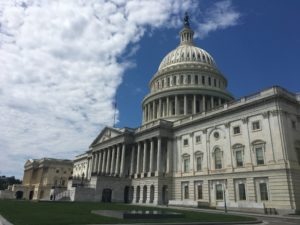
Anyway, podcasts are a much bigger part of my life and consume a surprising amount of time, so I thought I would use this space to list them out. They are mostly political. But please note that this post is not called The Top Political Podcasts You Absolutely Must Listen To, or even a set of recommendations. It’s just what works for me, and since there are only so many podcast-able moments in the day (mostly walking to and from work, back when that was something I did) these happen to be what have settled in to my routine so far.
P.S. Having said that, after typing everything out it is interesting for me to notice that all of the shows with a single presenter are headlined by men. There are many female voices on the mixed-presenter and panel shows, but nevertheless it’s a bias which I don’t like and will try to shake up. Now if only I could convince Melissa Benn to host a weekly show…
Podcasts Where I Listen To Every Episode
The Weeds (Vox Media)
This is my favourite podcast and the one I most look forward to. A twice-weekly roundtable discussion on US politics and policy, The Weeds is a good mix of reaction to major news events (e.g. Trump’s national emergency declaration or any election results) and evergreen policy topics (such as childcare or the minimum wage) but always with a huge amount of actual policy substance, expertise and insight. If you want to know how complex systems actually work (e.g. healthcare, immigration, crime) then you should listen to this. It is a great shame that there is nothing which does quite the same thing for the UK.
Talking Politics (University of Cambridge)
Hosted by Professor David Runciman, this has a more academic feel than The Weeds and is less concerned with policy than raw political economy and geopolitics. It’s also a bit more doom-and-gloomy, especially with Helen Thompson (the most interesting participant) on hand to explain why anything with a glimmer of positivity will actually collapse in a tangle of intellectual contradictions. That said, I do really enjoy this.
Revisionist History (Panoply)
Malcolm Gladwell’s always fascinating podcast about “things overlooked or misunderstood” which is guaranteed to make you think differently about a topic. The most memorable example was the episode about Brown v. Board of Education (the 1954 Supreme Court decision striking down racially-segregated schools) which was always presented to us in school as a triumphant moment for civil rights. We never considered the impact on black teachers.
Political Thinking with Nick Robinson (BBC Radio 4)
The BBC’s former Political Editor, Nick Robinson, and his weekly “big interview” with a British political figure. I basically half-like this podcast. I like getting away from short, adversarial interviews and giving people more time to express themselves. But it is a little too focused on stories of people’s upbringing, perhaps because Robinson feels uncomfortable being “gentler” while taking about contentious policy details. He should listen to a few Ezra Klein episodes and try it.
More Perfect (NPR)
I loved this show! One of the most on-point recommendations which I’ve ever received (thanks, McKenna!) this is a fascinating look at the history of the Supreme Court. Unfortunately each subsequent series has become ever more gimmicky, culminating in a slightly cringe-worthy album of songs about each amendment to the US Constitution which – though they still told very interesting stories about them – was filled with the religious reverence for the written constitution which always haunts American politics. That said, I learnt a lot from this show and heartily recommend it.
Podcasts Where I Listen To Most Episodes
Friday Night Comedy (BBC Radio 4)
This rotates between whatever show is currently playing in the BBC Radio 4 comedy slot. I always listen to Dead Ringers and The Now Show and usually catch The News Quiz, but obviously skip the strange and unfunny stuff which crops up in-between. They just need to add Just A Minute in here and it would be perfect.
The Ezra Klein Show (Vox Media)
Ah, Ezra Klein. One of the hosts on The Weeds and a co-founder of Vox in the first place, this is a twice-weekly series of long (sometimes absurdly long) interviews with public figures and intellectuals. Occasionally it can feel repetitive (I hear about the agonies of Twitter on this show far more often than I ever bother to look at Twitter) but by and large the conversations are rewarding to listen to.
Podcasts Where I Pick And Choose
Planet Money (NPR)
This is a really good and deservedly popular show, telling interesting stories from the world of economics. There’s just too much to listen to, so I only end up hearing the episodes which particularly catch my eye.
Worldy (Vox Media)
Sigh. This should be The Weeds but for the world! Only that’s clearly impossible because the audience doesn’t have enough context, the hosts can’t be as immersed in the details of each individual country and holding provocative opinions about ‘other people’ always sounds more patronising than talking about your own country, so it ends up being a slightly frustrating jaunt through US foreign policy obsessions.
Global News Podcast (BBC World Service)
This is the twice-daily global news bulletin that I know I should be listening to but never seem to get around to anymore because it is less ‘fun’ than everything else, which I guess demonstrates the dilemma for the Worldy crew. Still, even just scanning each contents of the episode before guiltily deleting it unplayed will remind me of the global news stories I shouldn’t be forgetting about.
Pod Save America (Crooked Media)
This is the candy floss of political podcasts – fine to enjoy occasionally, but not really doing you any good and leaving you feeling a bit queasy if you over-indulge. Weirdly (because it’s a weird thing to get upset about) I remember getting particularly annoyed during Roy Moore’s candidacy at their blithe refusal to imagine why Republicans might logically want to vote for him.
FiveThirtyEight Politics (FiveThirtyEight)
Really addictive during a presidential election (like refreshing the FiveThirtyEight homepage every half an hour to see the graph change) but ultimately a little pointless since opinion polling is such a narrow lens on the world. During the next presidential election I’m not sure I will be able to resist listening, but it’s probably a bad habit.
The Briefing Room (BBC Radio 4)
This actually is quite good if you need a short 30-minute crash course on a current affairs issue with a British focus, such as the rollout of Universal Credit or the increase in homelessness. It’s never going to have the time to really dive deeply into an issue, but it is a good example of the ‘explainer’ rather than ‘debate’ format of journalism.
The Documentary Podcast (BBC World Service) / Analysis (BBC Radio 4)
I’m bundling these together because episodes of Analysis are often scooped up and included under the banner of The Documentary, which has a more international focus. Either way, this is the classic tradition of BBC current affairs journalism on a vast range of topics.
Other shows which I sometimes enjoy, depending on the political climate, but don’t have a lot to write about:
- UK Politics (FT)
- Alphachat (FT)
- Politics Weekly (The Guardian)
- More or Less (BBC Radio 4)
- The Media Show (BBC Radio 4)
- Westminster Hour (BBC Radio 4)
- The Good Fight (Slate)
One-Off Series I Have Enjoyed
The Assassination (BBC World Service)
Do you remember when Benazir Bhutto, the former Prime Minister of Pakistan, was assassinated at a rally in 2007? No? This is an incredible investigation which worms its way deep into the heart of the Pakistani state and is well worth your time.
Slow Burn (Slate)
Yes, I know in theory this is coming back but each season is pretty self-contained. The first covers the impeachment of Richard Nixon, the second of Bill Clinton, and both ask the question: what was this like to live through at the time? What contingencies and coincidences led to history proceeding as it did? Whatever you think you know about Watergate and/or Monica Lewinsky, this show will show you something new.
Intrigue: The Ratline (BBC Radio 4)
Just an interesting series about the life of a high-ranking Nazi and his mysterious disappearance and then death after the Second World War. The story is made possible through the help of his son, now an old man who sounds like he lives in a disintegrating castle, who is not himself a Nazi but is determined to cling to his vision of his parents as good people caught in bad circumstances.
